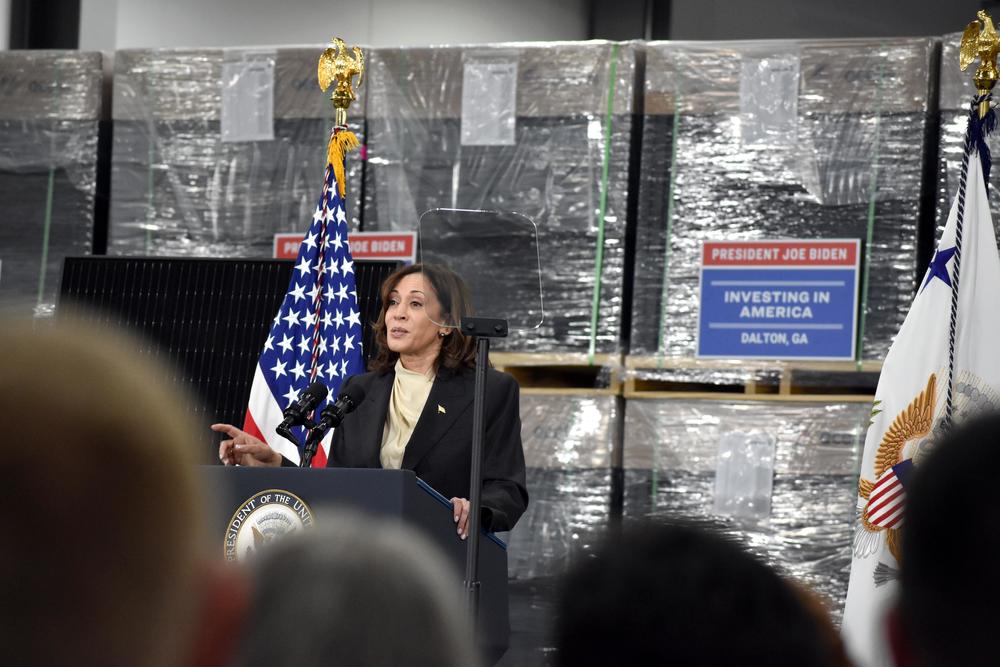
Caption
Vice President Kamala Harris speaks at the Qcells solar panel factory in Dalton, Ga., Thursday, April 6, 2023.
Credit: Stephen Fowler / GPB News
LISTEN: As Democrats look toward a future without President Biden as its nominee and the lens in many respects turns its focus on Vice President Kamala Harris, how should the media frame her bid to become the Democratic party’s nominee? GPB's Peter Biello speaks with investigative journalist Nicole Carr about the media's approach.

Vice President Kamala Harris speaks at the Qcells solar panel factory in Dalton, Ga., Thursday, April 6, 2023.
As Democrats look toward a future without President Biden as its nominee, journalists are writing the first draft of this historic moment. As the lens in many respects turns its focus on Vice President Kamala Harris, how should the media frame her bid to become the Democratic party’s nominee? GPB’s Peter Biello spoke with Nicole Carr, an investigative journalist and adjunct professor at Morehouse College.
Peter Biello: News broke Sunday about President Biden dropping out of the race. Biden immediately endorsed Vice President Kamala Harris. Several prominent Democrats followed his lead. How would you characterize the coverage of Harris so far?
Nicole Carr: You know, I think we have gone out of our way to figure out what comes next without looking at what is reality. There, In the immediate aftermath, I saw a lot of coverage of what would a Gavin Newsom ticket look like? What would a Gretchen Whitmer ticket look like? Even as we heard President Biden back Harris. And then we began to see all of these prominent Democrats, including Whitmer and Newsom, back her. There was still this narrative of, you know what? What —who comes next? Who comes next? We worked ourselves in a pretzel to avoid looking at Harris as the next. And I think we have to ask ourselves "why?" Why wasn't the narrative — why weren't we shaping this narrative in terms of, you know, the vice president as a natural next step? And so I think when we're — we're thinking about our beats, I mean, we — we not only have a democracy beat to cover, we have a race beat. You know, we have to understand the tenor of America. But we have to understand why we've skipped over her is the main narrative in the past couple of weeks.
Peter Biello: Pundits are already speculating about the role race and gender will play if Harris is indeed the nominee. What do you think is important to keep in mind when either creating a narrative that involves discussion of race and gender, and consuming such a story when it appears in the media?
Nicole Carr: You know, I think the basics will never lead us in the wrong direction, right? It is always good to understand how people, the voters, the people who will decide this thing, really think. That's a basic concept, right? Get on the ground, talk to the people who matter. It's not the pundits. We don't start the narrative with even the donors. We start with the people. And that's who we're reporting for. I'll give you an example. Last night I tweeted, you know, a note about, you know, seeing how well-sourced newsrooms would be with Black women in this moment, because if you didn't understand what was happening on the evening of all this breaking news, you know, you — you should really step back and think about how you're going to be able to effectively cover this moment. What happened was this massive gathering of Black women on a last-minute Zoom call, organized within hours, where the limit on the Zoom call was a thousand women. And they somehow, you know, tapped the Zoom CEO, who opened up the session to 44,000 Black women. And by the end of the night, within four hours, they had $1 million raised to back Kamala Harris. And I think any — at least any Black woman journalist in America understood what was about to happen. That was quite a moment. And it's an opportunity for us to think about how identities in our own newsrooms play into our ability to cover the moment effectively.
Peter Biello: So what will you be watching for in the news media in the coming days?
Nicole Carr: I will be watching for the stories that really dominated the news cycles when we were talking about a Trump-Biden match up as it relates to age, cognitive ability performance. I'll be watching for whether we have some of the same comparisons with a man of Trump's age and performance on the debate stages, against a younger woman of color who holds the second office, the highest office of the land right now, I'll be looking for the ways in which we lean into the narratives we've leaned into over the past six months: if we do the same thing with these, two likely candidates. And I'll also be looking for opportunities for us to not normalize the abnormal; for us to really lean into pro-democracy coverage when we talk about what is at stake here. And I'll be looking for more coverage of policy and what these candidates — whoever they may be, wherever we land — what policy is centering the campaigns rather than the drama of the moment.